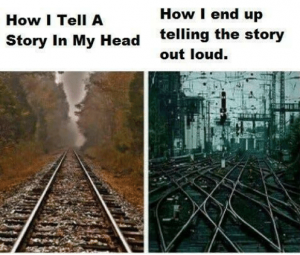
Image courtesy of ladywriter55 at FreeDigitalPhotos.net
What the…?
Okay folks, it is great to be a pantser. Break free of the constraints of outlining and worldbuilding. Just write things out and get it on paper. Fresh, new, exciting.
Then edit that draft!
Just read a story where the author was obviously a pantser. The action was constant, the plotting – not so much. The reveal of what the human female was and her ongoing issues felt very “slidey”; things were added during the pantsing writing and not fully integrated during subsequent editing passes.
Oh, let’s have her not just be human. First meeting of ex – helpful and healthy – oh, but wait … won’t it be better if he was poison as she starts a new relationship. Great additions, really help the story pop – but created an unevenness in the presentation, a feeling of being tacked on instead of full integration.

I understand that draft stage is boring. You know the story now. But this is the difference between telling a haphazard story among friends and creating a coherent manuscript.
Pants it all you want – just remember the tradeoff. With plotters, they do a lot of the prep work before hand. This is the exciting part to them. Writing it out is hard. For pantsers, writing out is fun, it is the draft work that is the chore. One way or the other, details and sorting things out for a full well-written document worthy of publication requires effort.
Go back and repair those pants.
Not being a regular writer, I’ve not encountered the term ‘pantser’ before, but from the tone I gather that it might be derived from “Flying by the seat of your pants”. Am I correct? If so, I may be guilty.
Yes, pantser / pantsing, is derived from “Flying by the seat of your pants”. I am a pantser for short stories and a plotter for the longer form. Most people are a mixture of both – length and genre have different requirements as does the creator. Thriller and mysteries tend to be plotter-friendly, the story’s timing or clues need to be figured out in advance. Romance and coming-of-age YA, which are more character-driven than plot-driven, respond better to pantsing – as the characters make decisions, the story changes. Science fiction and fantasy fall somewhere in-between.
I can see the distinction between the two styles, and the problems that can erupt in continuity when ‘pantsing’ – important elements being overlooked/ignored in one part of the story only to have them appear at some point out of thin air. You’ve recently touched upon several similar pitfalls that I now need to be more aware of in my own efforts.